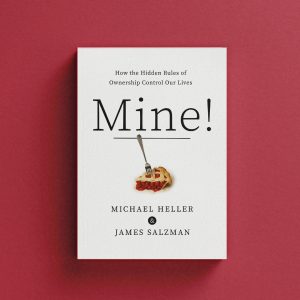Mine! How the Hidden Rules of Ownership Control Our Lives
New book explores the hidden rules governing who gets what and why

For the last six years, Michael Heller and I have been writing Mine! How the Hidden Rules of Ownership Control Our Lives. It comes out today! We wrote the Doubleday book because we think everyone should have access to the handful of simple insights that can make us more effective advocates for change as consumers, parents, and citizens. The book tells engaging, surprising, and often infuriating real-life stories that reveal the ownership rules of the 21st century.
- When is it okay to recline your airplane seat?
- Why does HBO tolerate, even encourage, you to share your password illegally?
- How can we battle climate change by making trees worth more standing than cut down?
- And what do you really own when you click Amazon’s “buy now” button?
Ownership invisibly shapes every single day of our lives. Every minute. These are the rules that determine who gets what and why. It’s where we live, what we listen to, the food we eat and medications we take, what makes us rich or poor. We encounter the rules of ownership all the time without noticing, like fish swimming in water.
Governments, businesses, and ordinary people are constantly changing the rules for who gets what. Each of these choices creates winners and losers. And this has always been so. At its core, human society exists to help us deal with competing claims to scarce resources – whether it’s food, water, gold, or sexual partners – so that we don’t kill each other too often.
It’s no coincidence that in every culture “mine” is one of the first words babies speak. Spend any time in a playground, and all you will hear is kids shouting mine, mine, mine. One kid shouts, “I had it first. It’s mine!” The other cries back, “Mine! I’m holding the shovel.”
You may tune out this shouting match. But if you listen carefully, you can learn something subtle and revealing about ownership. Each child is asserting an ownership story – in our example, it’s “first come, first served” versus “possession is nine-tenths of the law.” First-in-time and possession are two of the six stories that everyone uses to claim everything in the world.
Remarkably, governments and businesses use the exact same six simple stories that kids assert to solve fights on the playground. Owners of valuable resources are always trying to figure out the particular story for “mine” that will influence others to do their will at the lowest cost and with the least hassle. Simply by tweaking each story, they can steer you and everyone around you invisibly, gently, but powerfully to act how they want.
Don’t be fooled. Each side claims the moral high ground, each side wants the law bent towards its view. But there is no natural, correct rule for who owns what. It all comes down to competing stories. And because ownership is a story-telling battle, that also means it’s up for grabs. And these stories offer our best chance to address really big problems like preserving online freedom, reversing deforestation, and curbing America’s new wealth aristocracy.
Once you start looking for competing ownership stories, you will see them everywhere. We guarantee there’s a newspaper headline today that snaps into focus once you understand how ownership really works – just look at current debates over who gets to the front of the line for the Covid-19 vaccine.
We invite you to visit our website. To show you the stakes, we’ve made a free excerpt available – The False Promise of the ‘Buy Now’ Button –along with short videos that capture our key insights. Tomorrow’s post will explain why ownership engineering lies at the heart of cutting-edge environmental policy tools.






Reader Comments